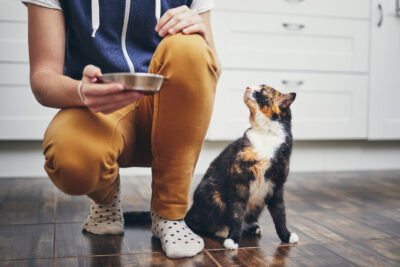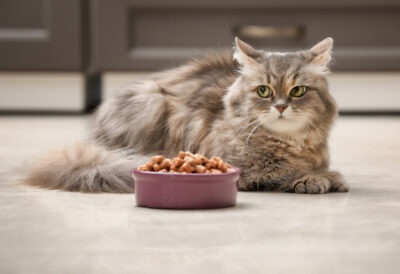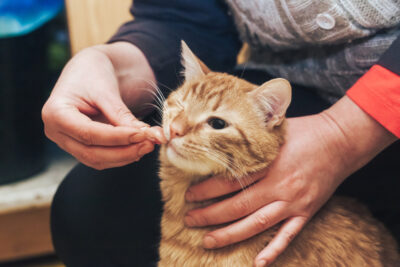What Is Gastrointestinal Cat Food? Information and Product Picks

All featured products are chosen at the discretion of the GreatPetCare editorial team and do not reflect a direct endorsement by the author or reviewer.
Gastrointestinal problems are no walk in the park for your cat — or you. Your cat probably feels miserable, and you’re left cleaning up the mess. Gastrointestinal cat food provides an option to relieve the misery.
This type of food can help manage cat digestive issues that affect a pet’s quality of life. Digestive issues are a common reason cats go to the vet’s office.
Don’t add a new cat food to your shopping cart just yet, though. It’s important to do your homework and speak to your veterinarian first before making the switch.
Keep reading to learn more about gastrointestinal cat foods and how to select one for your cat.
What is Gastrointestinal Cat Food?
Gastrointestinal cat food is formulated to address digestive issues caused by various conditions, such as inflammatory bowel disease (IBD) or food allergies. You will see both dry and wet cat food varieties available for purchase over the counter (OTC) or by veterinary prescription.
Unlike regular commercial cat foods, gastrointestinal cat foods steer clear of ingredients that could irritate sensitive stomachs. Examples include lactose, gluten, and food additives, such as artificial flavors, colors, and preservatives. While food allergies in cats are uncommon, cats can be allergic to specific ingredients, usually proteins. Common food allergens for cats include beef, chicken, and fish, so some gastrointestinal cat foods may use novel protein sources instead.
So, what is gastrointestinal cat food made of? Lots of good things! It contains numerous healthy ingredients and nutrients to provide complete and balanced nutrition for cats with tummy issues. Here are some common ingredients in gastrointestinal cat foods:
- Easily digestible carbohydrates
- High-quality animal protein
- Healthy fat source (omega-3 fatty acids)
- Probiotics to support a healthy gut
- Prebiotics to “feed” the beneficial gut bacteria
- Fiber to move food smoothly through the digestive system
- Antioxidant vitamins to support immune health
- Electrolytes, such as sodium and potassium
Gastrointestinal Cat Food: How It Helps

Digestion is hard work. For cats with sensitive stomachs, digestion can be even harder because the stomach and intestines may be inflamed or irritated. This leads to uncomfortable symptoms like vomiting, diarrhea, and perhaps constipation.
Cat food for gastrointestinal problems eases the workload of digestion, enabling improved nutrient absorption and movement of food through the digestive tract.
While making digestion easier, gastrointestinal cat food supports good gut health by reducing inflammation and helping the population of good bacteria in the gut.
This type of cat food can also target specific gut conditions. For example, hypoallergenic diets for cats do not include ingredients that could trigger food allergies. They typically contain a novel animal protein, such as duck or kangaroo.
If you’re unsure if your cat needs a gastrointestinal food, see the list below for some conditions for which a veterinarian might recommend this type of food:
- IBD
- Pancreatitis
- Food allergies and intolerances
- Hairballs
- Constipation
- Persistent vomiting (often yellow with bile) and diarrhea
- Recent gastrointestinal surgery
- Digestive upset with systemic signs (e.g., lethargy, reduced appetite)
Gastrointestinal cat foods can help manage chronic conditions, such as food allergies, or acute conditions, like constipation or a recent surgery. Your vet will advise whether your cat needs to be on this new diet long-term or short-term.
There are times, though, when GI foods might not be effective. This can occur if the underlying health issue isn’t addressed. For example, hyperthyroidism can cause vomiting and diarrhea in cats. A GI diet wouldn’t do much good until the hyperthyroidism is under control with appropriate treatment.
Be aware that numerous conditions can cause gastrointestinal issues in cats. Even if you think your cat could benefit from a GI diet, your vet will first need to examine your cat to determine what’s causing their symptoms, in part by ruling out a long list of potential underlying conditions. From there, they can recommend an appropriate diet to help reduce your cat’s symptoms.
Cat Food for Gastrointestinal Health: 7 Vet-Recommended Picks

If your vet recommends gastrointestinal cat food, it’s time to search for options. Fair warning: there are a lot of feline gastrointestinal foods from which to choose. Here are seven for you to consider, all of which provide complete and balanced nutrition:
- Royal Canin Gastrointestinal Fiber Response Dry
- Purina Pro Plan Veterinary Diets Cat HA Hydrolyzed Diet Dry
- Hill’s Prescription Diet i/d canned stew
- Royal Canin Gastrointestinal Moderate Calorie Thin Slices in Gravy
- Blue Natural Veterinary Diet Cat NP novel protein alligator dry
- Purina Pro Plan Veterinary Diets Cat EN Gastroenteric Naturals Dry
- Royal Canin Hairball Care Dry
Royal Canin Gastrointestinal Fiber Response Dry
This gastrointestinal dry cat food from Royal Canin contains two types of fiber — soluble and insoluble — to move food smoothly through the digestive tract and promote good stool quality. It also contains prebiotics to feed healthy gut bacteria and omega-3 fatty acids to reduce gut inflammation. Chicken is the main protein source, so keep this in mind if you think your cat may have a food allergy.
Highlights
- Fiber promotes healthy digestion and good stool quality
- Prebiotics support the growth of healthy gut bacteria
- Omega-3 fatty acids help reduce gut inflammation
Things to Consider
- Requires a veterinary prescription
- Pricier than regular cat foods and OTC GI foods
- Chicken may trigger food allergies

Purina Pro Plan Veterinary Diets Cat HA Hydrolyzed Diet Dry
Veterinarians often recommend hydrolyzed diets for cats with food allergies. The proteins in these diets have been broken down into smaller parts using water (hydrolysis), making them too small to trigger an allergic reaction. Hydrolyzed diets are often used for food elimination trials to help diagnose food allergies.
Purina’s hydrolyzed diet is easily digestible and contains antioxidants to support a healthy immune system. It features hydrolyzed chicken liver as its protein source. Notably, both kittens and adult cats can eat this food.
Highlights
- Highly digestible
- Hydrolyzed protein won’t trigger food allergies
- Antioxidants promote immune health
- Kittens and adult cats can eat it
Things to Consider
- Expensive
- Requires veterinary prescription

Hill’s Prescription Diet i/d canned stew
Gastrointestinal wet cat food is ideal for cats who prefer wet food over dry. Veterinarians may recommend this Hill’s diet for cats who need nutritional support after recent GI surgery or an acute bout of digestive distress. The stew is a chicken and vegetable mix, so cats allergic to chicken should not eat it.
Highlights
- Canned food provides an enticing flavor
- Ideal for nutritional support after surgery or recent GI distress
Things to Consider
- Expensive
- Chicken could trigger a food allergy
- Requires a veterinary prescription

Royal Canin Gastrointestinal Moderate Calorie Thin Slices in Gravy
This Royal Canin gastrointestinal cat food is a good option if your cat tends to pack on extra pounds. It is a highly digestible diet that contains prebiotics, dietary fiber, electrolytes, and omega-3 fatty acids. The thin slices of gravy might appeal to a finicky eater. However, this food contains chicken, which could trigger food allergies in some cats.
Highlights
- Lower in calories to support healthy weight maintenance
- Prebiotics support gut health
- Dietary fibers promote smooth movement of food through the gut
- Omega-3 fatty acids help reduce gut inflammation
Things to Consider
- Expensive
- Requires a veterinary prescription
- Chicken might trigger a food allergy

BLUE Natural Veterinary Diet Cat NP Novel Protein Alligator Dry
If your cat is allergic to chicken, fish, or beef, they need a diet with a protein they’ve never eaten. This GI diet from Blue Natural contains alligator as its novel protein. Other high-quality ingredients include omega-3 fatty acids, flaxseed, antioxidant vitamins, and fiber. It is free of chicken, soy, and wheat.
Highlights
- Ideal for cats with food allergies
- Omega-3 fatty acids help reduce gut inflammation
- Antioxidant vitamins support immune health
- Fiber promotes healthy digestion
Things to Consider
- Expensive
- Requires a veterinary prescription

Purina Pro Plan Veterinary Diets Cat EN Gastroenteric Naturals Dry
This diet from Purina is easily digestible and contains fish oil as a source of omega-3 fatty acids and numerous vitamins and minerals. Chicken is the protein source, so cats allergic to chicken should not eat it.
Highlights
- Easily digestible
- Fish oil provides a source of omega-3 fatty acids
- Rich in antioxidants
Things to Consider
- Expensive
- Requires a veterinary prescription
- Chicken may trigger food allergies

Royal Canin Hairball Care Dry
Nobody likes hairballs. If your cat has a hairball problem, this diet from Royal Canin is a great choice. It contains several dietary fibers to move hair through the digestive system so cats can poop it out. However, like other GI cat foods on this list, it contains chicken.
Highlights
- Ideal for cats with hairballs
- Dietary fiber helps hair pass through the digestive tract
- Fish oil provides a source of omega-3 fatty acids
Things to Consider
- Expensive
- Requires a veterinary prescription
- Chicken may trigger food allergies

Gastrointestinal Food for Cats Buying Guide
Gastrointestinal cat food is a specialty diet that is more expensive than regular commercial cat food. Prepare yourself to spend more than you usually would for your cat’s food.
As you research your options, look for the AAFCO (Association of American Feed Control Officials) statement on the label. This ensures the food provides complete and balanced nutrition according to life stage (growth/reproduction, adult maintenance).
The ingredient lists on pet food labels are challenging to decipher. Please do your best to identify the ingredients we listed in this article, including prebiotics or probiotics, omega-3 fatty acids (or a source of it, like fish oil), and vitamins and minerals. Avoid foods that contain artificial flavors, colorings, or preservatives.
Don’t worry if you can’t make sense of the ingredients list. You can ask your vet to walk you through it.
Generally, manufacturers formulate GI cat foods for adult cats. However, kittens can enjoy one of the diets we recommend on this list: Purina Pro Plan Veterinary Diets Cat HA Hydrolyzed Diet Dry. If your kitten or senior cat has GI issues, ask your vet for guidance on a GI food option.
Fortunately, GI cat foods aren’t likely to interfere with your cat’s current medications or complicate treatment for other medical conditions. However, it’s always good to check with your vet about this. For example, cats with chronic kidney disease have to limit their intake of phosphorus and protein. You’ll want to ensure that the GI diets you’re considering are also appropriate for your cat’s other medical conditions.
Transition your cat slowly to the new diet to give your cat’s digestive system time to adjust. Start with a mix of 25 percent new diet/75 percent old diet. Over a few days to a week, gradually increase the percentage of the new diet until you’ve entirely phased out the old diet.
Observe any changes in your cat’s symptoms, better or worse, and report them to your vet. If the symptoms worsen, your vet may recommend trying a new diet.
Finally, be patient! GI issues are frustrating, and there may be some trial and error in finding the right GI food for your cat. Continue working closely with your vet to give your cat the relief they need from their tummy troubles.









